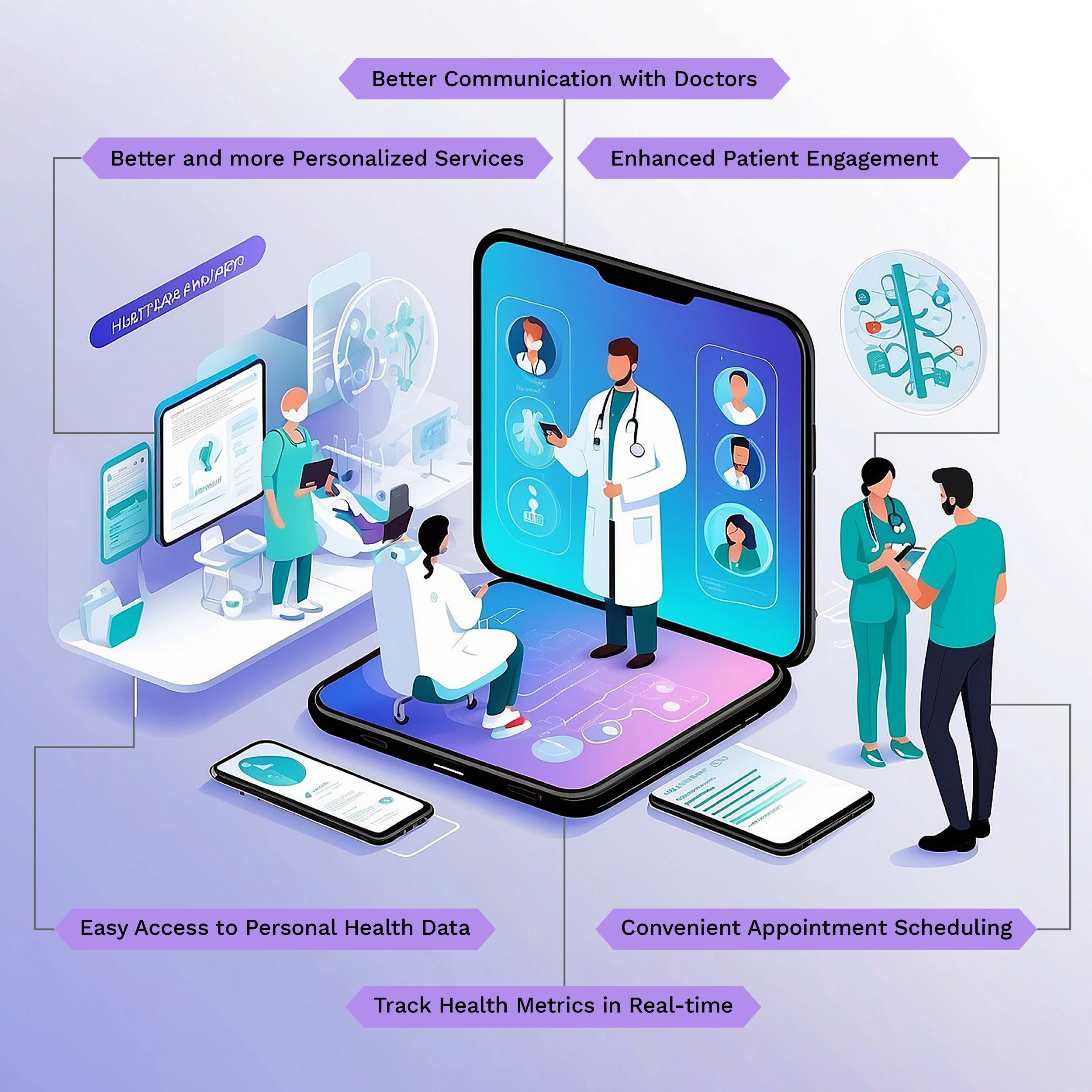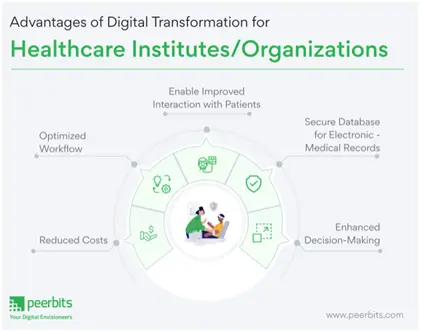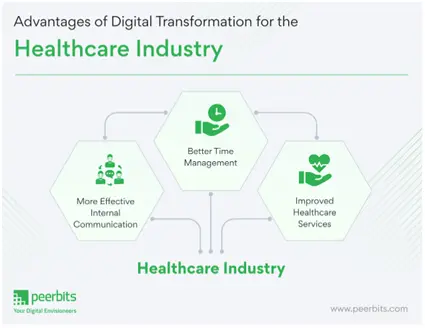Technology has been playing a very pivotal role in so many aspects of our lives be it shopping, banking, and travelling. It will always be there to bring breakthroughs in various sectors. If we take the example of tech in healthcare, there is still room to make notable advancements. According to statistics, 74% of organizations prioritize digital transformation.
The healthcare sector has seen a massive transformation because of the rapidly changing landscape of digital technology. The digital shift has shaped the way medical experts diagnose, cure, and observe patients, as well as carry out other administrative tasks. According to a report, worldwide spending on digital transformation is estimated to reach $3.4 trillion by 2026.
What Does Digital Transformation Mean in Healthcare?
We often hear the phrase ‘Digital Transformation’ in the healthcare industry. Digital transformation means utilizing technology to benefit and add value to patients and healthcare institutes. The two examples of digital transformation would be Electronic Health Records (EHR) to see patient information and telemedicine to help patients find a doctor.
Digital technologies such as the Internet of Things (IoT), Telemedicine, and so on can help healthcare providers give better care to the patient and enhance the patient’s experience. Additionally, digital healthcare is also helpful in decreasing costs by leveling up efficiency and setting a good communication between the patient and provider. With the ongoing development in the healthcare industry, digital transformation will act as a major player in carving the future of care.
How Does Digital Transformation Facilitate Better Healthcare?
Digital transformation in the healthcare industry has shown positive results in many ways such as increased accessibility of medical care at hospitals or handling administrative tasks. Below are a few key factors that help in the transformation of healthcare:
The Increase in Non-Communicable Diseases
The healthcare system is faced with challenges as Chronic diseases/non-communicable diseases (NCDs) are putting strain on healthcare systems globally. World Health Organization (WHO) states that most adult causes of death globally are NCDs, which kill 41 million people each year, similar to 74% of deaths worldwide. These numbers are going to increase in the future as the population continues to age.
To keep running the healthcare system smoothly, a digital transformation solution is the need of the hour. These solutions will not only ensure early detection, and effective and faster disease cure but also aid in averting the rise of chronic illness in adults.
Patient Wants More Individual Care
The global rise in access to information technology has increased the expectations of patients from healthcare organizations. The patient needs more appropriate and customized care. The COVID-19 pandemic has greatly influenced the shift in patient expectations. As per a survey done by McKinsey, 40% of the public said they would continue to use telehealth in the future as well.
Medical Institutions Experience Staff Shortages
With the ever-increasing need for convenient and consistent care, medical facilities suffer workforce shortages in numerous parts of the world. In a paper published by the Qatar Foundation, World Innovation Summit for Health (WISH), in association with WHO, 23 to 46% of healthcare personnel reported mental fatigue during the COVID-19 pandemic, with 20 to 37% experiencing depressive symptoms.
As a result, it is more critical than ever to preserve healthcare personnel’s emotional and physical well-being. Digital transformation in healthcare can assist in simplifying workflows and automating tedious tasks, decreasing the need for workers and their ever-increasing workloads.
Healthcare Organizations Want to Decrease Costs
One of the healthcare system’s most significant difficulties is the costs of running medical care and infrastructure as they continue to rise while compensation is under pressure. As stated by Statista, global health spending per person was $1,129 in 2019 and is expected to increase by $1,515 by 2050. However, more money spent does not always result in greater outcomes as 25% healthcare expenditures are often misused in the US.
However, more money spent does not always result in greater outcomes as 25% of healthcare expenditures are considered wasteful in the U.S. Wasteful healthcare spending in healthcare are the services and products that either don’t provide any advantages or are dangerous for the patient.
Therefore, cutting waste and boosting operational efficiencies has become a top focus for healthcare professionals. To identify where the most gains can be made data-driven insights are very useful in that.
Benefits of Digital Transformation in the Healthcare Sector
If medical professionals and hospitals digitize medical records and improve communication methods, patients and healthcare organizations will directly gain enhanced efficiency and deliver higher-quality treatment. With that being said, let’s quickly go through the top reasons for digital transformation in healthcare sector.
Benefit for Digital Transformation for Patient

- Improved Customized Solutions
One of the key advantages of digital transformation in healthcare is the potential to provide patients with better and customized solutions. Doctors can employ data analytics and cutting-edge technology to assess their patient’s unique health needs and develop personalized treatment plans that cater to their patient’s specific problems.
- Better Doctor-Patient Communication
The digital transformation of healthcare enables patients to communicate discreetly with their doctors. They can schedule an appointment right away, send messages, and even video conference with the doctor if required. Patients get professional aid through chat, and video calls with medication and therapy plans via email or their application page.
- Shorter Waiting Time for Doctor Visit
The digital shift has resulted in much shorter wait times at doctors’ offices. Many doctors now provide same-day appointments using telemedicine systems, rather than booking appointments months or even weeks in advance. This allows people to get peace of mind as they can avail themselves of the required treatment in the comfort of their home.
- A Simple Display of Personal Health Data
Patients can now view their health information online thanks to digital transformation. This allows people to manage their medical history, medicines, allergic reactions, and other data quickly and conveniently. Customers can evaluate all treatments and services accessible on the market, helping them make more informed healthcare decisions.
- Measure Health Metrics in Real-Time
Health trackers and smart wristbands can monitor a patient’s fitness level, heart rate, sleep patterns, and other features.
This information can assist patients in better managing their health and implementing required lifestyle changes. The information can also be communicated to their doctor, which leads to more effective and informed care.
- Scheduling an Appointment
Patients can now consult their healthcare professionals more rapidly because of digital advancements. Many healthcare organizations, for example, now provide online scheduling, allowing patients to arrange appointments without having to call or visit their doctor’s office.
Benefits of Digital Transformation in Organization

- Enhanced Patient Care
Organizations’ patient care gets improved by implementing healthcare solutions such as telemedicine apps, remote patient monitoring systems, EHR systems (Electric Health Record), and others that are designed using modern technologies.
With telemedicine apps, patients are able to plan appointments and even contact doctors online who fulfill their medical expertise, availability, quality of service, and consultation cost requirements.
Healthcare organizations can also use electronic health data to gain insights into making quick, informed choices to offer more accurate and individualized care to patients.
- Improved Medical Staff Efficiency
The implementation of digital healthcare solutions across the hospital helps to streamline various administrative activities, such as billing, scheduling visits, and tracking staff assigned to certain treatments. EHR systems allow authorized people to readily access and handle information about patients.
With all of these, healthcare organizations can run smoothly and use the time saved to focus on patient care.
- A Data-Driven Decision Making
By developing an EHR system with data science support, healthcare organizations can perform data analysis on their patient records and gain important insights for making data-driven healthcare decisions. This method of intelligent medical record analysis aids in the early detection of patient ailments before they progress to chronic disorders. This allows the organization to use the electronic health record (EHR) for preventive healthcare.
- Improved Healthcare Workers and Patient Interaction
Communication is important in the healthcare industry since it allows doctors to give patients better diagnoses. Digital change in the healthcare business enables hospital staff to stay up to date on patients’ dosages and health to handle future medication and treatment appropriately.
- Excellent Security and Privacy
Yes, digital transformation brings up concerns regarding data privacy and security. Organizations can, however, ensure top-tier security and privacy by complying with the HIPAA regulations and the digital healthcare system security standard procedures specified there.
- Lower Costs
Making digital transformation in healthcare has a significant impact on cost savings for healthcare facilities. Using healthcare software systems, hospitals can automate administrative operations such as appointment scheduling, bill production, patient data updates, and much more, saving time that can then be used for more patient care.
Benefits of Digital Transformation in the Healthcare Industry

- Improved Internal Communication
The entire healthcare business is heavily reliant on communication to offer good patient care. And digital transformation promotes more efficient and open communication among all parties.
- Effective Time Management
Digital transformation can save considerable amounts of time in the healthcare industry. This has the potential to save many lives due to constant access to the patient’s medical information and real-time coordination.
- Better Healthcare Services
Because the healthcare sector is patient-centered, advanced techniques need to be used to provide precise and accurate diagnoses and treatments.
Digital transformation enables the integration of diverse technologies, allowing healthcare professionals and organizations to give more effective and individualized treatment to patients.
Key Factors of Digital Transformation in Healthcare
To understand why there is an industry-wide movement toward digital healthcare solutions, we must look at the causes of their increasing popularity. The following are the primary factors of digital transformation in healthcare:
Artificial Intelligence (AI)
The most obvious application of AI in digital healthcare services is to automate record-keeping tasks and eliminate errors made by humans. However, AI can also be utilized to do predictive diagnostics and create individualized patient treatments. Another way AI will be able to revolutionize the healthcare sector is by utilizing Artificial Intelligence chatbots.
Internet Of Things (IoT)
IoT devices have a wide range of potential applications in medicine. First and foremost, health wearables that collect critical biometric data will serve as the foundation for future real-time, accurate patient profiles. Second, hospitals will soon have a surge of IoT-connected devices, which will provide a continuous stream of real-time information and insights and make operations efficient.
3D Printing
3D printing has expanded the possibilities for making prosthetics and personalized implants. It’s a fascinating design technology that discovered a new use in digital healthcare transformation.
How eInfochips Can Help with Digital Transformation
The digital transformation is changing healthcare for the better. Newer technologies are enabling innovative solutions. The Internet of Things (IoT) allows healthcare practitioners to provide remote patient care by leveraging modern and portable technologies.
At eInfochips, we enable this change through expertise in miniaturization, mobility, connection, and machine-to-machine communication. We have extensive experience developing FDA Class 2 and Class 3 medical devices for health monitoring, diagnostics, imaging, and telemedicine.
eInfochips has always done a commendable job with years of experience for its clients. A few examples would be the world’s first edge-AI-based portable ultrasound device was developed by eInfochips as the client was looking for an engineering partner with strong engineering capabilities.
Another example is a non-invasive incontinence monitoring device by eInfochips where the challenge was to have a low memory footprint, precise real-time monitoring, and notification. eInfochips faced these challenges with stronger solutions and built a complete hardware design and prototype, developed web and mobile applications for the device, user, and tenant management.
To know more about our key offerings and solutions related to the healthcare industry, contact our team of experts today.
Bottomline
The healthcare sector is undoubtedly headed in the right direction, thanks to digital transformation, artificial intelligence, and the Internet of Things. All of this has significantly decreased human labor, and the most exciting aspect is that it has cut patients’ medical expenses, thereby empowering them.
With digital transformation, patients no longer must wait in long lines for treatment because Telemedicine has been implemented, much to their satisfaction. They can even gain access to their reports through the cloud. Digital transformation is a way forward for an advanced and hassle-free future for the patient, organization, and the healthcare industry with added benefits.













